Early this morning, Turkey’s parliament passed a package of controversial constitutional amendments. The vote was just shy of the two-thirds majority needed to adopt the reforms outright and will now head for referendum. In an e-mail interview, Council on Foreign Relations’ senior fellow for Middle Eastern Studies Steven A. Cook explains the controversy surrounding the reform package. WPR: What are these reforms responding to, domestically and in terms of EU accession? Cook: The constitutional amendments are in response to domestic politics. There is general agreement across the political spectrum that Turkey needs a new constitution. The present constitution was written […]
Europe Archive
Free Newsletter
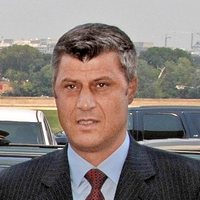
PRISTINA, Kosovo — Tensions ran high in the Balkans on the day, two years ago, that the people of Kosovo announced their momentous decision: “From today onwards,” Prime Minister Hashim Thaci solemnly declared on Feb. 17, 2008, “Kosovo is proud, independent and free.” The streets of Pristina erupted in celebration at the news that Kosovo’s long-awaited independence from Serbia had finally arrived. At the time, however, many predicted yet another Balkan war. More than two years later, Kosovo has defied the prophecies of the pessimists who believed armed conflict would inevitably break out again if Kosovo dared to declare independence. […]
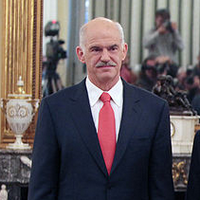
With last year’s swine flu scare already a distant memory, the risk of a new epidemic is spreading across Europe. This time the fears have to do not with the H1N1 virus, but with the debt contagion facing Europe’s PIIGS: Portugal, Ireland, Italy, Greece and Spain. With each of these countries carrying high debt-to-GDP ratios, financial markets are growing increasingly skeptical that Greece’s debt crisis will be successfully quarantined within its borders. The last two weeks have seen downgrades in Greek, Portuguese, and Spanish bonds, tumbling stock markets, and flight from the euro to the safe haven of the dollar. […]
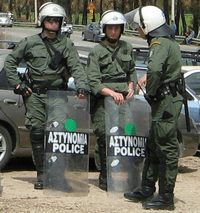
A new chapter in Greece’s debt crisis began after the EU and the IMF agreed to provide a $145 billion financial aid package to the troubled country. The agreement is conditional on Athens implementing a severe austerity program expected to reduce the public deficit from the current 13.6 percent to less than 3 percent by 2014. Despite the package, the difficulties ahead remain daunting. In order for the bailout to succeed, Prime Minister George Papandreou will have to face a number of challenges that will require all his political skills — and some luck. Papandreou’s first challenge will be to […]
The co-chairs of the OSCE Minsk Group met today in a closed meeting to discuss the current state of negotiations between Armenia and Azerbaijan on the Nagorno-Karabakh conflict. In an e-mail interview, Thomas de Waal, senior associate of the Carnegie Endowment for International Peace, explains where negotiations stand today. WPR: What are the principle issues that still need to be resolved in the Nagorno-Karabakh conflict? De Waal: The fundamental unresolved issue in the Nagorno-Karabakh conflict is the same one that triggered the conflict back in Soviet times in the Gorbachev era in February 1988: the status of the disputed territory […]
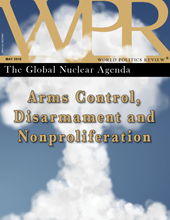
This World Politics Review special report is a compilation of World Politics Review’s top articles on the global nuclear agenda from July 2009 through April 2010. The report includes articles on arms control, disarmament and non-proliferation. Below are links to each article, which subscribers can read in full. Subscribers can also download a pdf version of the report. Not a subscriber? Subscribe now, or try our subscription service for free. Disarmament Movement Needs Youth Involvement to Counter Cynicism By Johan BergenäsJuly 30, 2009Moving Past STARTBy Richard WeitzAugust 4, 2009Obama’s Challenging NPT AgendaBy Miles A. PomperAugust 4, 2009Keeping Swords, Building PlowsharesBy […]
Iranian President Mahmoud Ahmadinejad delivered a searing, accusatory speech against the West at the United Nations yesterday, causing many nations — such as France, the U.K. and the U.S. — to walk out before he was done speaking. Ahmadinejad talked about the West’s culpability for the escalation of the international arms race.
France 24 interviews European Commission president José Manuel Barroso on the measures being taken to secure Greece’s economy. Barroso says that he believes Greece is the worst case within the Union and other troubled countries, such as Portugal, are taking the correct preemptive measures to prevent needing widespread financial assistance.
I once again had the pleasure of appearing on France 24’s week-in-review program last Friday, “The World This Week,” along with IHT Executive Editor Alison Smales, RFI’s Philip Turle and the Sunday Telegraph’s Anne-Elizabeth Moutet. The subjects were the U.K. election, the Greek Debt Crisis, the oil spill in the Gulf of Mexico, and French President Nicolas Sarkozy’s visit to China. Part one can be found here. Part two can be found here. I’ll also, once again, take the opportunity to add some subsequent thoughts that the discussion triggered. With regard to the British elections, I can’t make any predictions […]
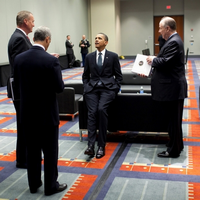
In recent weeks, the members of the Obama administration have developed a comprehensive strategy for the Eighth Review Conference of the Nuclear Non-Proliferation Treaty (NPT), which began yesterday. The administration’s declared position is to use the conference and other opportunities to strengthen all three of the treaty’s core objectives or “pillars”: disarmament, nonproliferation, and peaceful uses of nuclear energy. U.S. officials have stressed their support for the fundamental trilateral bargain behind the NPT: Countries with nuclear weapons will move towards eliminating them; states without nuclear weapons will not seek to obtain them; and all countries will enjoy access to peaceful […]
Walter Russell Mead is worth reading on the Greek debt crisis, here and here. Nice to see I’m not the only one who thinks the EU response ultimately produced the most potentially effective, if still uncertain, outcome. But I still seem to be the only who thinks that, and that the EU will get by with some added economic governance along the edges. The Lisbon Treaty was an institutional tweak from which people expected miracles. Once we get past the post-messianic letdown, things won’t seem that bad. Oh, and by the way, for everyone going on about Angela Merkel’s “failure […]
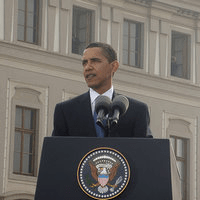
President Barack Obama’s multipronged approach to minimizing nuclear risks — embodied in the simultaneous roll out of the Nuclear Posture Review, the START follow-on treaty with Russia, and the Nuclear Security Summit — is nothing if not ambitious. Taken together, these steps mark a potential turning-point for U.S. nuclear strategy by reducing the role of nuclear weapons and by prioritizing efforts to lock down weapons-usable material, clamping down on nuclear terrorism, and strengthening international rules against proliferation. As the Nuclear Posture Review puts it, “Changes in the nuclear threat environment have altered the hierarchy of our nuclear concerns and strategic […]
